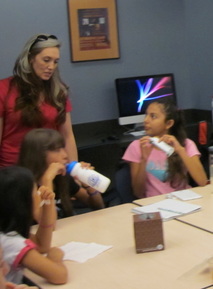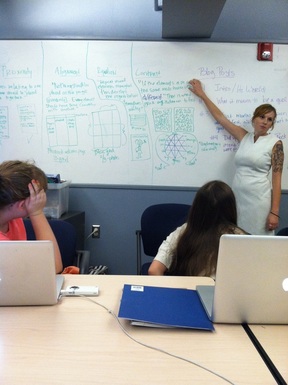Mentorship

Mentorship comes in many forms and is present in corporate and academic settings, but as technofeminists we are most interested in mentoring as a part of a feminist ethic of care as introduced by Carol Gilligan. Gilligan’s 1982 work, taken up by a variety of scholars since (Larrabee, 1993; Held, 2006), considered differences she noted in female experiences related to moral development. According to Larabee (1993), “Her work thus trumpets aspects of women’s experience found defective, deficient, or undervalued by the broader culture” (p. 5). Gilligan’s (1982) work does not necessarily attribute these differences to gender, explaining, “clearly these differences arise in a social context where factors of social status and power combine” (p, 2). While Gilligan focuses on stages of moral development, we take up in this project considerations of what we morally owe colleagues, our field, and members of the communities we serve. For Gilligan (1982), "...the way that people talk about their lives is of significance... the language they use and the connections they make reveal the world that they see and in which they act” (p. 2). At the heart of her work, then, are relationships and connections, just as our own work as technofeminists celebrates the powerful relationships formed between mentors. Like Larrabee we are interested in the voices Gilligan discovered in her work: “The voice she discovered was one of care and responsibility, of concern and connection with other people” (Larabee, 1993, p. 4).
In our own field, many have discussed the important role that faculty members play in mentoring graduate students (Lauer, 1997; Blair and Cadle, 2010) into local and national scholarly networks, modeling best practices in research through collaboration and expanding the reach of the traditional classroom. Even at the professional level we see computers and writing faculty embracing the power of relationships to inform and support our field. In her retrospective on the success of the Computers in Writing Intensive Classrooms (CIWIC) – now 30 years old - and its successor Digital Media and Composition (DMAC), Julia Voss explains these professional development spaces owe much of their success to founder Cynthia Selfe’s commitment to “prioritizing people first” (2011. p. 16). CIWIC, founded in 1986 at Michigan Technical University, and DMAC following in 2006 at the Ohio State University, not only foreground technical skills and increasing awareness of multimodal literacy practices, but “the institute’s structure [also] encourages attendees to socialize and network around the ideas and methods they encounter, deepening their engagement with institute content and increasing the likelihood that they will adopt it” (Voss, 2015, p. 22). Relationships and care, then, are already deeply rooted in our field as pedagogical tactics and ways of shaping and enhancing our discipline.
In our own field, many have discussed the important role that faculty members play in mentoring graduate students (Lauer, 1997; Blair and Cadle, 2010) into local and national scholarly networks, modeling best practices in research through collaboration and expanding the reach of the traditional classroom. Even at the professional level we see computers and writing faculty embracing the power of relationships to inform and support our field. In her retrospective on the success of the Computers in Writing Intensive Classrooms (CIWIC) – now 30 years old - and its successor Digital Media and Composition (DMAC), Julia Voss explains these professional development spaces owe much of their success to founder Cynthia Selfe’s commitment to “prioritizing people first” (2011. p. 16). CIWIC, founded in 1986 at Michigan Technical University, and DMAC following in 2006 at the Ohio State University, not only foreground technical skills and increasing awareness of multimodal literacy practices, but “the institute’s structure [also] encourages attendees to socialize and network around the ideas and methods they encounter, deepening their engagement with institute content and increasing the likelihood that they will adopt it” (Voss, 2015, p. 22). Relationships and care, then, are already deeply rooted in our field as pedagogical tactics and ways of shaping and enhancing our discipline.

The importance of mentoring programs for underrepresented faculty and student populations is at the heart of a 2006 study by Omofolasade Kosoko-Lasaki, Roberta Sonnino, and Mary Lou Voytko. Focusing on women and minority faculty and students in the health sciences, the study found that mentoring is “an important element in promoting academic excellence for both faculty and students” (p. 1449). The authors define mentoring as “the process of providing younger and less-experienced individuals with support, counsel, friendship and constructive example in order for them to succeed in their careers and life” (p. 1449) and find this mentoring is particularly necessary when it comes to women. While mentorship is a thing both Almjeld and England have been lucky to receive during their careers, positioning our camps as informal mentoring models may encourage others in computers and writing to seek out other nontraditional ways to mentor faculty, students, and community members.
Mentorship has played a huge role in both of our careers. Kristine Blair served as Almjeld’s dissertation advisor and mentored her formally and informally. Whether collaborating on a written piece (Almjeld & Blair, 2012), presenting together at conferences or in Blair’s easy and purposeful introductions to others in the field, Almjeld believes Blair’s mentorship can be felt in all facets of her teaching, scholarly interests, and the ways she engages communities beyond the academy. Almjeld served as England’s mentor in the early years of her doctoral program and continues to serve as her mentor from a distance. Through program guidance, experience with advocacy writing, partnership in community work, and now assistance navigating the job market, England has developed as a teacher, scholar, and community advocate because of Almjeld’s dedication to mentorship. We believe a commitment to mentoring, to including and involving scholars at all phases of career and experience, allows for community engagement to thrive and to be more than “drive-by engagement.” Mentorship is at the heart of sustaining community outreach in that it builds an infrastructure that expands and supports work done in multiple communities.
Mentorship has played a huge role in both of our careers. Kristine Blair served as Almjeld’s dissertation advisor and mentored her formally and informally. Whether collaborating on a written piece (Almjeld & Blair, 2012), presenting together at conferences or in Blair’s easy and purposeful introductions to others in the field, Almjeld believes Blair’s mentorship can be felt in all facets of her teaching, scholarly interests, and the ways she engages communities beyond the academy. Almjeld served as England’s mentor in the early years of her doctoral program and continues to serve as her mentor from a distance. Through program guidance, experience with advocacy writing, partnership in community work, and now assistance navigating the job market, England has developed as a teacher, scholar, and community advocate because of Almjeld’s dedication to mentorship. We believe a commitment to mentoring, to including and involving scholars at all phases of career and experience, allows for community engagement to thrive and to be more than “drive-by engagement.” Mentorship is at the heart of sustaining community outreach in that it builds an infrastructure that expands and supports work done in multiple communities.